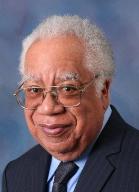

Known as the “godfather of black psychology,” Dr. Joseph L. White was born in 1932 in Lincoln, Neb. He received bachelor’s and master’s degrees in psychology from San Francisco State University and his PhD in clinical psychology from Michigan State University.Dr. White spent most of his career at the University of California at Irvine, but held various titles at different locations around the United States, such as researcher, professor, dean, clinician and consultant.
While at the California State University at Long Beach, he was instrumental in establishing the Educational Opportunity Program (EOP), which has provided “educational access and opportunity for more than 250,000 low-income and educationally disadvantaged students throughout California, the majority of whom are first-generation college students.” Details on the program are available at the Educational Opportunity Program website.
In 1968, White also worked with 57 black delegates to the American Psychological Association to demand reform within that organization. White and four other black psychologists met with the executive council to demand that more blacks be admitted to doctoral programs and to change the prevailing conclusions in psychology texts that blacks were an inferior race.
An important article written by White and published by Ebony magazine in 1970, entitled “Toward a Black Psychology” also challenged traditional psychological theories that he explained were inadequate to understand black lifestyles and unfairly led to blacks being defined as deviant or intellectually inferior to whites. Some of what he focused on emphasized the distinguishing characteristics among many African Americans such as collective, rather than individual, survival, respect for elders; an oral tradition, a spiritual nature, and a fluid, as opposed to a linear, perception of time.
The article also argued that whatever the future of race relations and the destiny of black people, the creation of a Black Psychology was necessary because the psychology created by white people could never adequately apply to African-Americans. Dr. White went further to point out that the application of mainstream white psychology to black people resulted in weakness-oriented deficit finding, rather than an accurate appraisal of the situation of people of African descent.
Though today he believes that black psychology is still not totally accepted, the strongest area of acceptability, he says, lies in the practitioners receiving multiethnic psychology in their training.
White has taken a special interest in seeing that black students join the professional ranks, particularly in psychology. At Irvine, White and his colleagues established what they call a “Freedom Train”-which is a network of connections with about eight graduate schools around the country that are receptive to Irvine students. They try to block enroll two or three students at a particular school who can then look after students who come after them.
Dr. White is the author of numerous papers and books: The Psychology of Blacks (2011; 1999; 1990; 1984); The Troubled Adolescent (1989); Black Man Emerging: Facing the Past and Seizing a Future in America (1999); Black Fathers: An Invisible Presence in America (2006; 2011); Building Multicultural Competency: Development, Training, and Practice (2008).
